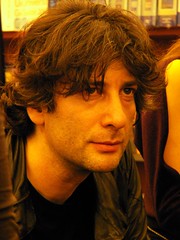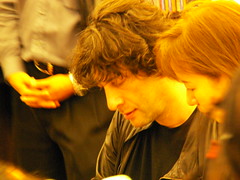Neil Gaiman and Book Signings


*promptly gets beaten up by a dozen Goth chicks*
Book signings.
Why do authors do book signings?
Literary agents recommend it as a good way to market one's books and build up one's fan base. Seasoned book signers, it is said, would know how to work the crowd to create social interaction between themselves and their audience and also between the people waiting in line to get their books signed. Who knows? They might get together and start another fan club. The publicity posters, the announcements in the bookshop, the popping camera flashes, the snaking queue and the media reviews enhance the author's profile, visibility and brand, generate interest and might induce curious onlookers to pick up a book or two, thereby increasing sales (and royalties). Gaiman says that he isn't in it to make money.
I do them because it's good to go and meet people, and because, while exhausting, they're also more or less fun, and because it makes a change from sitting in a room and making things up. And it makes numbers into people, which I like.Why do people go to book signings then?
Some want to be recognised and acknowledged by the author as his fans. They want to connect with him and own a bit of him (even if it is his swiggle). Some are curious about what the author looks like, how he gets his ideas and why he expressed them in this particular way. The more mercenary go to book signings to increase the value of their books after the author's death.
It's interesting that although many of the people that Project Timothy bring in are good and even popular authors in their own right, none of them have ever done a book signing. Suggest to an evangelical that he get his copy of Graeme Goldsworthy or Vaughan Roberts signed, and he'd stare at you with horror and (after checking your temperature) offer to do Two Ways to Live with you again.
I sometimes give books and CDs as utilitarian presents. Don't scribble well wishes in them so people can re-gift or sell the stuff if they want to, but many girlies get offended: "it's not personal like that" some say, "we have nothing to remember you by". And if I become a famous preacher or writer, others say, they would be able to pull out the gift, show it to their grandchildren and say they knew me from way before. Of course if I ended up a mass murderer or infamous hacker or virus programmer [this almost happened recently when i accidentally left my executable virus experiments lying around at home], they'd shake their head and warn the kiddies not to follow in my murky footsteps.
If one of us does manage to string together some words or produce a CD that people would actually be willing to pay hard-earned money for, and someone asked us to autograph their book or CD, what should we do?
Should we scoff at their "immaturity", rebuke them for putting us mere humans on a pedestal and subsequently turn this shocking behaviour into a sermon illustration?
I guess firstly, we shouldn't judge their motives before talking to them.
Secondly, while talking to them, Phillip Jensen's account of a wedding-ring blessing incident is instructional in thinking about the confluence of the love for God, love for right theology and love for people:
PJ was telling a young pastor that a visiting couple had approached him before a service and asked him to bless their wedding ring.
"Surely you didn't agree!" gulped the young pastor at this superstitious travesty.
"Surely I did", murmured PJ. He met the couple after the service, sat them down at the back of the church hall and asked about their marriage. They talked and laughed about and gave thanks for the joys and prayed about the problems. He told them the gospel and of God's great and wonderful design for marriage.
Did he ever bless the wedding ring? Like PJ's middle name, that awaits further revelation.
But the point is this: if the gospel is true and God's words recorded in Scripture are true, then truth isn't just confined to formal meetings like bible studies or services or to strict legalities where we require every one to jump through our Pharisaic hoops. The truth about God, about right theology and about love for others goes out to meet people where they are. And when it meets them, it cares for them gently and genuinely.
Labels: Marriage, Neil Gaiman







<< Home